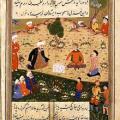177 - To Be or Not to Be: Debating Avicenna’s Metaphysics
Posted on
Avicenna’s distinction between essence and existence triggers a running debate among philosophers and theologians.
Themes:
Further Reading
• P. Adamson and F. Benevich, The Heirs of Avicenna: Philosophy in the Islamic East, 12th-13th Centuries. Metaphysics and Theology (Leiden: 2023). [open access]
• D.N. Hasse and A. Bertolacci (eds), The Arabic, Hebrew and Latin Reception of Avicenna’s Metaphysics (Berlin: 2012). [Papers by Wisnovsky and Eichner.]
• Y.T. Langermann (ed.), Avicenna and his Legacy (Turnhout: 2009).
• R. Wisnovsky, “One Aspect of the Avicennian Turn in Sunni Theology,” Arabic Sciences and Philosophy 14 (2001), 65-100.







Comments
to be or not to be?
The difference between Existence of God (swt) and the Existence of the Human is the same in theoretically implication that we all Exit. But in practical term in the realm of Existence, they differ from each other! So depending from which angle we are looking and arguing from the Eixitance of God (swt) and created beings, they can be the same or different. Because the Essence of God (swt) is unique and includes His (Swt) Existence, Gods (swt) Existence differs from our Existance that our essence doesn’t include our Existence within practical implications. But in the theoretically understanding of Existance God (swt) Exists like created beings Exist, in the manner that they exist. But a philosopher wants to categories and understand differences and therefore it has more beneficial applications when focusing on the practical implication that our Existence differs from the Existence of God (swt) So I would argue that Al Razi and Tusi are not contradicting each other but rather compliment each other in the way that Al- Razi talk more on the theoretically implication and Tusi on the practical implication. Where as I think Al-Razi was more focused on tackling the concept of Suhrawardī and his doubts that there isn’t even such a thing as external existence. Which is quite interesting to note here because this doubt in existence of a external world comes up again in the philosophy of Rene Descartes. Would you say there is a link and influence of Avicenna, particular the floating men example and Islamic philosophers like here in the discussion of Existence on the thinkings and writings of Rene Descartes? To the question:is the non existent sister of you a thing? Mutazelites: yesAsharites: no If God (swt) wants a thing to exist, he says to it be and it is! What we understand here in this beautiful Quranic example is that, the “thing" does not yet exist till God (swt) says “BE” and than it comes into Existence. So we see that a thing does not yet exist in physical reality till it is transformed into the physical reality. And we also see that the potential thing exists in its potential but not in a realized state prior to its physical existence. Which supports the view of Avicenism that there are different forms of existence! What we have again is the problem of the language usage and its implication: Do we consider a thing just to be anything or nothing? To be or not to be, as you pointed out quite nicely! “Thing” or Ding/Sache in german comes from the latin word “res” and is being used in the english language as “realitas” or Reality. Why is that important? Because with the help of definition we can narrow the spectrum of implication of which position describes “the non existing sister” most adequate. if your non existing sister is a thing she must be real. if she is real she needs to be examined, perceived independent of your own subjective thought that she is real! if this is not the case ( and I think this is not the case) than your sister cannot be real and therfore also not be a thing. But what is your non existent sister than if not a thing? Because we can think of her in our imagination which shows me that there is something rather than not. If that thought is not real or existing how can I even have that thought in the first place? The answer comes from modern Physics: We know that our thoughts are a product of electrical impulsis interacting with neurons. The electrons however don’t have a mass on their own and are hence not real things. It is the Higgs field who gives the fundamental particles a mass due to interactions with them. So we see that a mass status or a real thing comes into being by its interactions, if all shared interactions by all values participating in it, the more something has mass or is real. But because we cannot examine your sister in the interaction of the physical real world, hence she is not a real thing sharing interactions with other individuals in the physical dimensions. So your sister is not a thing in the physical reality and stays just a concept in the imaginative mind with no existence in the physical world. I think thats how the focus went in the Asharites position that they defined like us today a thing to be in the realty of the physical perceived independent world of us humans.
Individuation
I've listened to this episode once again. Wondering if there is a debate on the principle of individuation in the islamic philosophy. This cannot be essence - it's universal, it cannot be be exixtence - whether analogical or univocal.
Thanks.
In reply to Individuation by Stoev
Individuation
Well, I associate this problem a bit more with Latin medieval philosophy (see episode 216), but yes, it definitely comes up. It is important in Avicenna, and then in debates over his philosophy in the later Eastern tradition, for instance concerning his theory of soul.
The Status of Nonexistent Objects
It is fascinating the way philosphical debates recur independently of each other. I've been reading a little recently about the debate over ens rationis in 17th century scholasticism. In that debate Francisco Suarez takes a position rather like the Mutazelite position while Juan Caramuel takes a position more like the Asharite position. I am looking forward to hearing your take on the scholastic debate when you (eventually) get to the 17th century in Europe.
(The books I've been reading on the subject are Ens rationis from Suárez to Caramuel by Daniel Novotny and Universals in Second Scholasticism by Daniel Heider)
In reply to The Status of Nonexistent Objects by Nathanael
Ens rationis
How interesting! I am actually going to be pointing out in an episode coming up that the late 13th c debate over the nature of being also mirrors debates that developed independently in the Islamic world. Anyway I am also looking forward to covering that late scholastic material. Should be good fun, and maybe my non-existent sister can make a (non) re-appearance!
Isn't Al-Tusi more like Scotus?
Hi Peter,
I thinking through the comparison between Al-Tusi and Aquinas, it seems to me that Al-Tusi is much more like Scotus than Aquinas. Toby Mayer translates Al-Tusi saying, "If [the ambiguity of existence] is proved, then the problems of this noble man [i.e. Razi] are completely solved. This is because existence is predicated of what is beneath it with a single meaning as the philosophers held, and the equivalence of its subjects does not follow from that (namely, the existence of the Necessary and the existence of contingents) in reality. For [via ambiguity] things variant in reality might share in a single concomitant." This way of talking sounds a lot like Duns Scotus. There is a single meaning (for Scotus, a single, atomic concept of 'being') that applies to things that are varient in reality (for Scotus, God and creatures are "primarily diverse"). Scotus says that since it's the same concept in "God is a being" and "Fluffy the cat is a being" the relation between 'being' in each sentence is univocity. But if we compare the entities themselves, then they are primarily diverse and share in nothing together (they don't fall under the same genus). Al-Tusi describes the relation as one of ambiguity. I wonder if he says this because he is not just comparing the concepts, but comparing a concept+its referent (God) in one sentence and the same concept+its referent (a creature) in another sentence.
What do you think? I'm no expert on Al-Tusi. So, I'm curious what you think?
In reply to Isn't Al-Tusi more like Scotus? by Scott Williams
Tusi on being
Thanks for the question. I'd have to have a closer look at the passage but I suspect what he means is this: obviously, a defender of the analogy-ambiguity theory like Aquinas, Henry of Ghent, or Tusi wants to avoid total equivocation. That is, we should be able to use the word "being" for God and creatures in related ways, albeit different ways. So Tusi is saying that this is possible: you can apply the word to both God and creatures; he's also (I think) saying there that being (or actually existence, wujud) is applied univocally to everything other than God i.e. existence is the same in all creatures, it is only different in God. So this I take it is why he is saying "existence is predicated of what is beneath [God] with a single meaning."
Scotus' view is rather that being is genuinely univocal i.e. applied to both God and creatures with exactly the same meaning, not two different but related meanings; we differentiate God from creatures by adding further predicates like infinite and necessary.
Does that help?
Incidentally you might have seen that I have now covered Scotus' view and its rivals in episode 260.
In reply to Tusi on being by Peter Adamson
Et Tusi, Scotus?
Hi Peter,
I am not persuaded (yet) that Tusi's theory is incompatible with Duns Scotus's theory. (I am familiar with Scotus's fairly well; I've published on it (see the forthcoming Oxford Handbook of the Epistemology of Theology, the chapter on Duns Scotus).)
Could you say why you changed "existence is predicated of what is beneath it with a single meaning" to "existence is predicated of what is beneath [God] with a single meaning"? The antecedent of 'it' is 'existence' and not 'God', or so I thought? If Scotus's view can be glossed as "same in simple concept, different in referent" then Al-Tusi's view is consistent with it. It's the line "For [via ambiguity] things variant in reality might share a single conconmitant," that sounds very much like Duns Scotus and very much not like Aquinas or Henry of Ghent. Henry of Ghent, for example, does not hold that there is a single concept of being that is predicable of God and creatures. Scotus thinks there is. And so too Al-Tusi.
(For others, the Toby Mayer text is found in _Before and After Avicenna_ chapter 10, "Fahr Ad-Din Ar-Razi's Critique of Ibn Sina's Argument for the Unity of God in the Isarat and Nasir Ad-Din At-Tusi's Defence", p. 213).
Thanks,
Scott
In reply to Et Tusi, Scotus? by Scott Williams
What is "it"
Ah, maybe you're right - probably in the Arabic we just have a pronoun so one could argue about the referent but let's even assume it's "existence." Anyway I am arguing on the basis of what I know about Tusi's position in general, which is that he is famous for taking an analogy view (he is the proponent of the analogy view, at least until we get to Sadra). So he for instance even thinks that tashkik (modulation/analogy/ambiguity) applies to substance and accident, never mind created things and God. In light of this the passage you quote is puzzling but I guess he is just trying to say that though existence is of different types for different essences, we can still use the same term in all cases and so he does not have to admit, as Razi might argue, that we are dealing with sheer homonymy.
Another thing one would need to think about for this passage is his use of the word "concomitant" (in Arabic probably lāzim) since I think he would deny that existence is in fact a concomitant of God, at least in the same sense: for God it would at a minimum be a necessary and essential concomitant, where in creatures a non-essential, accidental one. But he standardly makes the stronger claim that God or God's essence is just identical to (His) existence.
In reply to Tusi on being by Peter Adamson
Three main positions?
Hi,
I'm wondering if part of the confusion and disagreement might arise from thinking of al-Tusi being more like Aquinas or more like Scotus. From my point of view, though I may very well be wrong, it sounds like al-Tusi, as described here, is intermediary between Aquinas and Scotus.
For Scotus, at least on most interpretations, being is truly univocal across the board (including God).
As summarized here, for al-Tusi, being is univocal for creatures but only analogical when extended to God. The difference is God/creatures. All creatures have univocal wujud.
For Aquinas, being is truly analogical across the board. This means not only that God and creatures have analogically related being. It also means that my being (existence, esse) and a giraffe's are analogical to one another. They are not, as for al-Tusi (apparently), univocal. Aquinas would not claim that. His essences and existences have proportionality one to another, thus without the same essence, existence is not present or applied univocally.
So, the way I hear things and the way they are generally summarized, there are three, not two, primary positions/theories in this debate on Avicenna. Al-Tusi is halfway between Scotus and Aquinas. He is not really proposing the same theory as either of them.
Maybe this explains the confusion and disagreement in this years-old thread? (Maybe not?)
In reply to Three main positions? by Ben Embley
Analogy
Yes, that does sound right. Maybe there were also Latin scholastics who had a view like Tusi's, so a two level analogy theory. And there were certainly Muslim thinkers with a view like Aquinas', for instance Sadra.
Add new comment